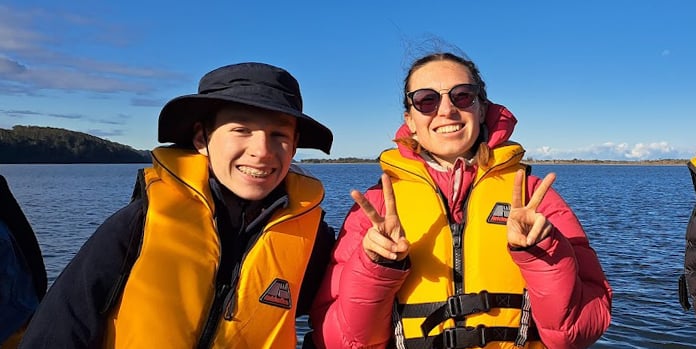Wadhurst English and History teacher, Airlie Stewart, reflects on the unexpected moments experienced on a Term III Year 8 outdoor education expedition.
The trip was not your average holiday. It was five demanding days of hiking, biking and kayaking. No showers, no beds, no phones. Braving the elements and carrying everything. No contact with home.
However, the thing about camping is that from the moment we wake up in the tent, which is whenever the sun comes up, to the moment we sit around the campfire, we are 100 per cent present. The impact of removing screens and devices from the fingertips of the students was immense. Surreal even.
The impact of the natural environment
Nature is a setting that gives us a perspective that is humbling. It was beautiful watching the students immerse themselves in the natural world and their innate sense of curiosity coming out to play. The ‘Yee-Hah’ group shared a particularly pertinent moment, silently watching the sunset over 90-mile beach.
Another perceptive observation was when one student described watching a tiny blue bird build a nest and thinking that he would never see that exact bird again – which somehow led into a philosophical conversation about how seemingly insignificant some moments are in the grand scheme of things, while others have a profound impact on us.
This unshackled curiosity was heart-warming. By harnessing adolescents’ innate sense of curiosity, we are fostering the thinking that is needed in an increasingly complex and globalised world. Furthermore, it was an unsung retreat for reflection and connection. An environment ripe for profound social and emotional development.
Around the campfire
There is something magical about a campfire on a dark winter’s night. From the irresistible glow of the flames to the pleasant scent of the burning logs, little effort is needed to gravitate towards a campfire as darkness settles.
Every night our little groups gathered around the dancing flames, hypnotised by the alluring hums, pops and crackles. In the same way humans find comfort in being close to water, we find solace in looking into the familiar flicker and crackling of flames. But something more powerful evolved from these traditional gatherings – a profound sense of vulnerability and emotional connection.
Although we had endured challenges throughout the day (physical and mental), you could feel the group’s spirit rise along with the smoke that drifted toward the stars. I was able to see the boys in a different light (only a small pun intended). I was genuinely touched by how profound some of these campfire conversations became. A great sense of vulnerability arose in storytelling, listening and sharing. The boys’ capacity to open up emotionally did not go unnoticed.
This was a truly mature and introspective group of young people. Many early adolescents are preoccupied with their own desires and needs. It is a rare commodity to behold such a cohesive and intuitive group of young people.
The thing that impressed me the most, in our week away, was the shift in thinking from self-centred to insightful and empathetic individuals. This resonates with The Rite of Passage notion to help the shift from an immature psychology of ‘life is about me and what I can get’ to the mature psychology of ‘life is about others and what can I give’.
The campfire became one of the most sacred, accepting, expansive and vulnerable spaces I have occupied with a group of young people in a long time. It was a privilege to share in such transformational moments. Memories the students will inevitably treasure and, I hope, will shape the relationships they continue to develop through adolescence.



